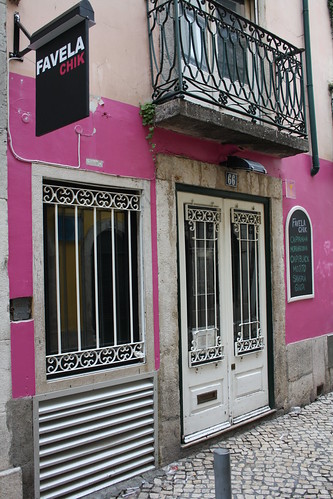The text calls the use of percussion from a number of genres "tribalist", including, absurdly, kwaito. Kwaito, whose percussion is derived straight from Chicago house with some hip-hop additions. (Here's a kwaito man practising his "tribalist" drumming.) I would just laugh at it, normally, as a clueless ignoramus using bigoted language to sell mediocre music, but there's a process at play here that scares me.
Because, it seems, even in 2010 we can't imagine South African music as something not "tribalist". And it seems we do our darnedest to make sure it stays that way.
 Last year Jace, aka DJ Rupture, wrote a great article channelling a lot of peoples' discomfort about the ethnification of third-world musicians. Along with many others, Jace has used his music and writing to do precisely what he suggests in the article - put a thong on the westerner, showing how all music is equally mixed, equally "ethnic", part of the same global rhizomic conversation. On the other end, it's been demonstrated again and again that supposedly "western" traits like electronics and modernity are extremely adaptable and easy to integrate by those so-called "tribal" people, who seem to have no problem at all ignoring "their" tradition once technology is available to them.
Last year Jace, aka DJ Rupture, wrote a great article channelling a lot of peoples' discomfort about the ethnification of third-world musicians. Along with many others, Jace has used his music and writing to do precisely what he suggests in the article - put a thong on the westerner, showing how all music is equally mixed, equally "ethnic", part of the same global rhizomic conversation. On the other end, it's been demonstrated again and again that supposedly "western" traits like electronics and modernity are extremely adaptable and easy to integrate by those so-called "tribal" people, who seem to have no problem at all ignoring "their" tradition once technology is available to them.And yet, the same dichotomy seems to persist.
The Eurocentric elite world: neutral, modern, cosmopolitan, free
Everyone else: ethnified, ancient, bound by tradition
You'd think with stuff like kuduro and kwaito finally penetrating to our latitudes we'd have lost this divide by now. But its power is strong, and it seems like we're not done putting the thongs on the natives, not by a long shot. My very first textbook about reggae kept harping on about oil drums and bamboo poles, however irrelevant they were to the contemporary music; the writer from 14 tracks above has to make sure that it's the non-"western" genres that are declared tribalist. Factual truth - like the fact that South African DJs have been doing house fusions much longer than any of the musicians on his compilation - doesn't really matter, as the important thing is to make sure the dichotomy stays intact.
Then yesterday I came across this. A dude in Berlin taking club music and making it "ethnic", that traditional worldbeat exercise circa 1990. One portion mainstream, "western" club music, one portion of someone else's tradition, and bang, you've got the neutral-ethnic dichotomy enforced in a single track.
What's fascinating, though, is that every one of the supposedly neutral genres evolved, the ones that are eventually "ethnified", originally come from marginal communities in some way. Dubstep and grime are from the Black Atlantic diaspora and the urban poor in England. Jamaican dancehall - which only recently seems to have turned cosmopolitan and neutral, witness the amount of western-produced tracks called something-riddim recently - is of course from Kingston's poorer neighbourhoods to a large extent. This is another tactic in the maintenance of the dichotomy: appropriation, not in the accepting-and-receiving-influence sense, but taking a cultural expression from somewhere and wholly taking over the interpretative space around it. In this case, carefully whitewashing any trace of supposed "ethnicity" from dubstep, grime, dancehall, and making them fit neatly into the "western" slot of the worldbeat dichotomy.
And yet, we're all ethnic. And we're all modern and rootless. Jace and others have done a lot to make this apparent, but it seems that there's still plenty of people around who want to slip music into one category or the other, for possible later fusion. Either music has to be "tribal" or it must be appropriated and neutralised by the west. And that makes for a very boring world indeed.


















































